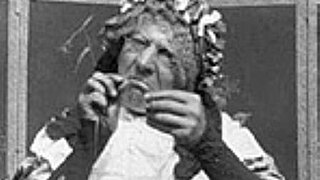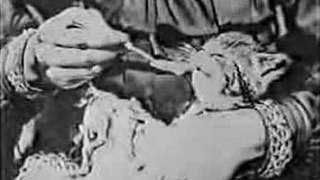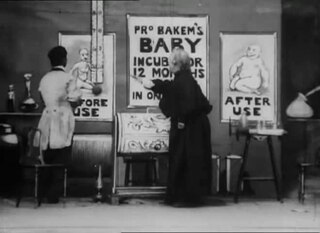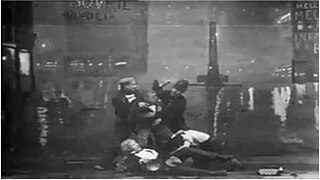Related Research Articles

A cheese sandwich is a sandwich made with cheese on bread. Typically semi-hard cheeses are used for the filling, such as Cheddar, Red Leicester, or Double Gloucester. A Guardian article called the cheese sandwich a "British lunchtime staple". Using a sandwich toaster or frying pan can transform the cheese sandwich into a cheese toastie.

The Kiss in the Tunnel, also known as A Kiss in the Tunnel, is a 1899 film British short silent comedy film, produced and directed by George Albert Smith, showing a couple sharing a brief kiss as their train passes through a tunnel, which is said to mark the beginnings of narrative editing. The film is the first to feature Laura Bayley, Smith's wife.

Grandma Threading her Needle is a 1900 British short silent comedy film, directed by George Albert Smith, featuring a grandma trying to get a thread though a needle. The sole purpose of the single-shot film, like the director's earlier Old Man Drinking a Glass of Beer (1898), according to Michael Brooke of BFI Screenonline, "is to record changing facial expressions for the purposes of entertainment."

The Sick Kitten is a 1903 British short silent comedy film, directed by George Albert Smith, featuring two young children tending to a sick kitten.

Spiders on a Web is a 1900 British short silent documentary film, directed by George Albert Smith, featuring a single shot close-up of two spiders trapped in an enclosure. The film is, according to Michael Brooke of BFI Screenonline, "less formally ambitious," than the director's, "groundbreaking multiple close-up study Grandma's Reading Glass (1900), made the same year, but is nonetheless, "one of the earliest British examples of close-up natural history photography, predating Percy Smith's insect studies by a decade."

Blackfriars Bridge is an 1896 British short black-and-white silent actuality film, directed by Robert W. Paul, featuring top-hatted pedestrians and horse-drawn carriages passing over Blackfriars Bridge, London. The film was, according to Michael Brooke of BFI Screenonline, "taken from the southern end looking northwards over the Thames by R.W. Paul in July 1896," and, "screened as part of his Alhambra Theatre programme shortly afterwards, certainly no later than 31 August"

Walter Robert Booth was a British magician and early pioneer of British film. Collaborating with Robert W. Paul and then Charles Urban mostly on "trick" films, he pioneered techniques that led to what has been described as the first British animated film, The Hand of the Artist (1906). Booth is also notable for making the earliest film adaptation of A Christmas Carol with the silent film Scrooge, or, Marley's Ghost (1901).

Undressing Extraordinary is a 1901 British short silent comedy film, directed by Walter R. Booth, featuring a tired traveller struggling to undress for bed. The film, "provides one of the earliest filmed examples of something that would become a staple of both visual comedy and Surrealist art: that of inanimate objects refusing to obey natural physical laws, usually to the detriment of the person encountering them," and according to Michael Brooke of BFI Screenonline, "has also been cited as a pioneering horror film," as, "the inability to complete an apparently simple task for reasons beyond one's control is one of the basic ingredients of a nightmare."

An Over-Incubated Baby is a 1901 British short silent comedy film, directed by Walter R. Booth, featuring a woman who gets an unpleasant surprise after placing her baby in Professor Bakem's baby incubator for 12 months growth in one hour. The film is, "one of the most original of the trick films made by W.R. Booth and R.W. Paul in 1901," and according to Michael Brooke of BFI Screenonline, "one of the less elaborate films made by Booth and Paul that year," "though the concept itself is so imaginative that it arguably didn't need any more than basic jump-cut transformations."

The Countryman and the Cinematograph is a 1901 British short silent comedy film, directed by Robert W. Paul, featuring a stereotypical yokel reacting to films projected onto a screen. The film, "is one of the earliest known examples of a film within a film," where, according to Michael Brooke of BFI Screenonline, "the audience reaction to that film is as important a part of the drama as the content of the film itself."

Artistic Creation is a 1901 British short silent comedy film, directed by Walter R. Booth, featuring a lightning sketch artist drawing a picture of a woman which comes to life piece by piece. The film, "is one of the earliest examples of a film about an artist's creations coming to life," and according to Michael Brooke of BFI Screenonline, "a metaphorical cautionary tale about the responsibilities that should be borne by both creative artists and indeed the male sex in general."

The Haunted Curiosity Shop is a 1901 British short silent horror film directed by Walter R. Booth, featuring an elderly curio dealer alarmed by various apparitions that appear in his shop.

The Extraordinary Waiter is a 1902 British short silent comedy film, directed by Walter R. Booth, featuring a brutish colonialist failing to destroy a blackfaced waiter. The film, "makes for somewhat uncomfortable viewing," but according to Michael Brooke of BFI Screenonline, "it's just about possible to read this as a metaphor for the rather more widespread frustrations arising from British colonial rule, though it seems unlikely that this was intentional on Booth's part."

The Cheese Mites (1903) is a British short silent documentary film, produced by Charles Urban and directed by F. Martin Duncan.

Footpads is an 1895 British short silent drama film, directed by Robert W. Paul, featuring a top-hatted pedestrian against a rainy London backdrop, who is assaulted by three footpads and rescued by a passing policeman. The "atmospheric" film, "is chiefly of interest for its imaginative approach to background décor," where according to Michael Brooke of BFI Screenonline, "some effort has been made towards establishing a sense of realism." Roland-François Lack of University College London points out that this painted backdrop looks like "a hybrid of Trafalgar Square, with its electric advertisement for Bovril, and Piccadilly Circus, with the advertisement for Mellin's Food", but has discovered that it in fact represents Ludgate Circus.

Comic Costume Race is an 1896 British short black-and-white silent actuality film, directed by Robert W. Paul, featuring comic costume scramble at the Music Hall Sports on 14 July 1896 at Herne Hill, London. The music hall sports day was an annual charity event consisting of other events such as egg and spoon races and three-legged races. The film is the best surviving pictorial record of the Music Hall Sports. It is not known who the race participants are.

Willie's Magic Wand is a 1907 British short silent comedy film, directed by Walter R. Booth, featuring a young boy terrorising the household with his father's magic wand. Similar to "earlier trick films The Haunted Curiosity Shop and Undressing Extraordinary ," this is, according to Michael Brooke of BFI Screenonline, "essentially a series of [loosely linked] special-effects set pieces," however, "the print in the National Film and Television Archive is incomplete, omitting amongst other things a come-uppance where Willie is punished for his misdemeanours by being turned into a girl, thus depriving him of more than one magic wand." A clip from the film is featured in Paul Merton's interactive guide to early British silent comedy How They Laughed on the BFI website.

Army Life; or, How Soldiers Are Made: Mounted Infantry is a 1900 British short black-and-white silent propaganda actuality film, directed by Robert W. Paul, featuring the King's Own Royal Lancaster Regiment riding over a plain. The film, which premiered on 18 September 1900 at the Alhambra Theatre in London, England, "is all that appears to remain of one of R.W. Paul's most ambitious projects," which, according to Micahael Brooke of BFI Screenonline, "had it survived in a more complete form," "would undoubtedly be considered one of the most important precursors of the modern documentary."
A House in Bayswater is a 1959 British television documentary directed by Ken Russell. It was his first BBC film not made for the Monitor series.
John Betjeman: A Poet in London is a 1959 British short film about John Betjeman directed by Ken Russell for the Monitor series. It was his first professional film. Russell made a second film with Betjeman, Journey into a Lost World, first shown in 1960.
References
- ↑ Brooke, Michael. "Cheese Mites, or Lilliputians in a London Restaurant". BFI Screenonline Database. Retrieved 24 April 2011.